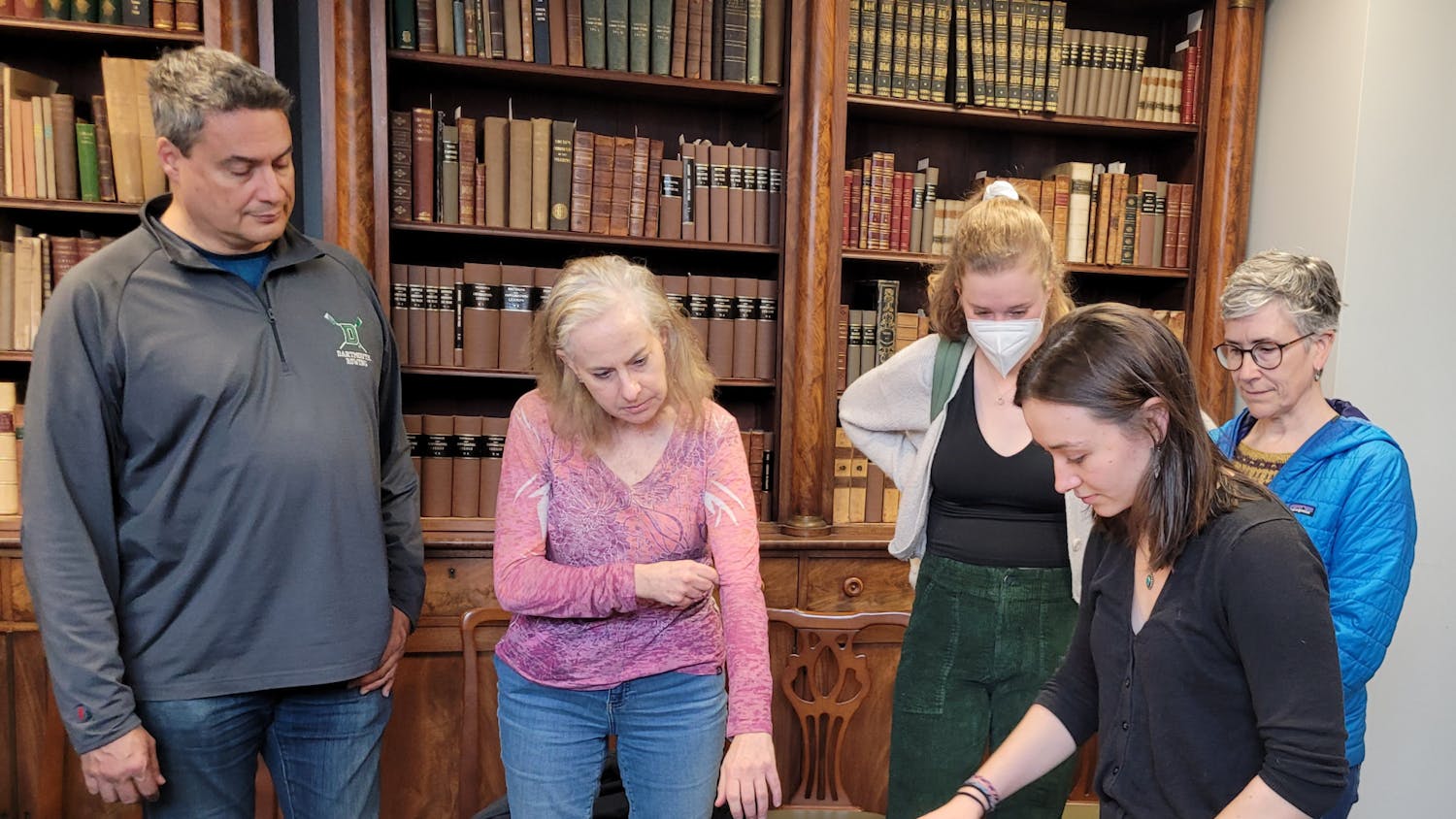Surrounded by the traditional green and white of Alumni Hall, over a hundred Dartmouth students gathered on Monday night as five male members of the Class of 2013 recounted stories of personal growth and struggle. The annual Men of Dartmouth panel seeks to challenge traditional masculine norms and Dartmouth stereotypes.
In his introduction, moderator and organizer Troy Dildine '13 described the event as an opportunity for the panelists to discuss their Dartmouth experiences while enabling those in attendance to focus on introspection.
Nate '13, Jason '13, Bernie '13, Matt '13 and Arturo '13 spoke about their individual struggles and unique Dartmouth stories, each characterized by personal development.
Nate
Nate described his difficulty in grasping how quickly his Dartmouth experience had passed and the reflective process of organizing his story.
Prior to his arrival at Dartmouth, Nate's experience was largely archetypal, and he described himself as well-rounded with a sense of self-reliance. Performing well in high school required little investment, but he said he faced a shift upon beginning his freshman fall at the College.
"Doing well on a test was like getting up in the morning, but getting to Dartmouth was like a slap in the face," Nate said.
Nate said he recalls feeling "shell-shocked" and academically insecure after his first year, emotions exacerbated by a tendency to avoid reaching out to professors and friends.
During his junior year, Nate became much more comfortable on campus and said he decided to translate a passion for the arts into the classroom while adopting a more self-forgiving philosophy.
Jason
Describing himself as a proud member of the Navajo Nation, Jason grew up on a Navajo reservation in Arizona and said he considers being Native American central to his identity.
Jason said he had "no idea that Dartmouth was in the Ivy League or what an Ivy league was" prior to arriving at the College. While his experience has been transformative, he said it has also been characterized predominantly by one word: failure.
He said he found classes to be strenuous and the shift to a college environment more difficult than expected, while enormous personal trauma made it difficult for him to cope emotionally.
Despite his setbacks, Jason said he strove to "learn from all that, to take it in and turn it around" and learned to recognize that everything can turn out for the best "as long as you try."
Bernie
Although he was born in Florida, Bernie grew up internationally, never finding a single place to call home. He said he spent the first 12 years of his life moving across the globe, living in countries including Switzerland and Thailand before finally settling down in the United States in the sixth grade.
He said he recalls feeling like "an outsider" and "kind of culturally ambiguous."
In high school, Bernie settled down with a core group of friends and discovered his passion for lacrosse, which he continues to play at the College.
Upon first arriving on campus, he felt daunted and lost, almost immediately perceiving a pressure to conform.
"I had that state of mind and that outlook," he said. "You go to Dartmouth, you should go into finance."
Ultimately, he said he discovered his strengths lay in other fields and recommended that audience members not conform to societal pressures if they lack the necessary passion.
Matt
Matt recalled a Dartmouth career of personal discovery and self-acceptance. He noted that his most rebellious undertaking in high school was deciding not to take the SAT a second time, and he reveled in the freedom and flexibility offered by college life.
This sense of freedom and adventure motivated him to embark on a cross-country bike tour during his freshman summer. Over the course of the trip, however, Matt lost a close friend in an accident that left him emotionally numb for the next seven months, he said.
"I just totally avoided talking about my feelings," he said. "It was easier to look like a guy because people didn't expect me to emotionally connect."
Matt, a transgender student, said the extremely difficult process of rebuilding his emotional well-being and accepting the loss of his friend ultimately aided him in understanding his own identity.
"I was presenting as a guy, because I was realizing that that was who I was," he said. "And I was having trouble with my emotions, and it felt convenient not to need to share them. It scares me, but does not surprise me, that I equated masculinity with not needing feelings. And it's the same about how quickly my mother accepted that."
Ultimately, Matt said he realized that his growing acceptance of his male identity and his difficulty dealing with his emotions after his friend's death were separate experiences, though he had used one as a crutch for the other.
Arturo
Arturo said he came to Dartmouth with one goal in mind to get a degree. As a first-generation student from a family of undocumented immigrants, Arturo said he did not consider having friends, fun and a community to be essential to the college experience.
"My family has always been kind of tight with budgets," he said.
Despite facing obstacles throughout his Dartmouth career, he described the opportunity to attend the College as a privilege, especially following an Los Angeles upbringing during which it was not always safe to travel home or to school due to the prevalence of gangs and drug-related violence.
"If there is anything Dartmouth has taught me, it was how to fail," he said. "It's taught me about disparities in our country and our education system."



